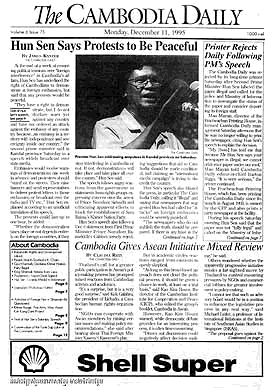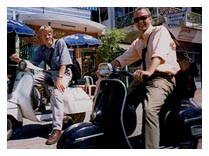
Also on this site:
On other sites:
Offline:
FAQ
Working for
The Cambodia Daily
I was at The Cambodia Daily from July 1995 until early 1997, and lived in Cambodia until early 1999. The information on this page is based on my experience, combined with what I know from my friends who have worked there or still work there. This is not an official site of the Daily; it is part of my own site.
How did you come to work at the Daily?In December 1994 I stumbled by chance across a help-wanted ad in the alt.journalism newsgroup. The Cambodia Daily, a small English-language newspaper, was looking for an associate editor. At the time, I was working for the Philadelphia Unemployment Project as Health Access Coordinator, and before that I had worked as an organizer for single-payer health care reform. I was burned out on politics in the US and needed to get out of Philadelphia. I e-mailed my resume. A few months and many e-mails later, I stepped off a plane onto the proverbially sweltering tarmac of Pochentong Airport in Phnom Penh. What's it like to work at the Daily--and why did you leave?
The Daily is small and quirky but maintains an extremely high standard of accuracy. I would be surprised to see any other paper that is so small maintain such a standard. Operations have been substantially professionalized over the years since its founding in 1993, but it is still a small paper and roles are not often well-defined.
The publisher, Bernard Krisher, is an American journalist, formerly of Newsweek, who has been living in Japan for many years. He is a unique and fascinating character, with boundless energy and an unstoppable flow of ideas. Like most of those who accomplish impressive things against the odds, his personality can be difficult on occasion (see Wired magazine, Nov 1999).
As I rose into a management role, some of our ideas about the organization came into conflict. In the end we did not agree on terms of a new contract, and parted on good terms in early 1997.
 How good/bad is the quality of life?
How good/bad is the quality of life?
Depends what you're into. Moving to Cambodia to work there was one of the best decisions I ever made. I don't regret for a moment that I came here and worked at the Daily. But it was not without its frustrations. In Cambodia you have to be willing to accept the unexpected and deal with many inconveniences and much frustration, stemming from your own status as an alien (at least initially). If you aren't adaptable, don't go.
What did you do on an average day?
See http://www.garella.com/rich/camnotes.htm#day
How is the paper produced over there? Do they use QuarkXpress? What type of technology do they have available?
Both the Daily and the Phnom Penh Post use Macintoshes. The Daily uses QuarkXPress for layout, then prints out onto tracing paper. A guy from the printing house picks it up and rides on his motorcycle across town to the press, where they shoot it onto metal plates and print onto A3 size paper. Color photos began to appear in 1998, after the New York Times proved it was safe.
But the technology, such as it is, takes a back seat to the editorial product. Because the foreign press is always in a precarious situation in Cambodia, the editing has to be very tight, with a constant mind to how the paper could have been affected if we got something wrong. We also tried to keep it consistent and grammatically correct because so many of the readers used it for their English studies. You may be interested in skimming the stylebook I compiled for use at the Daily.
|
Old Khmer saying: New Khmer saying: |
Yes. Costs are fairly low here, though high by third world standards. On a starting salary of, let's say, $833 a month plus housing, one could save up $200/month with a modicum of self-restraint. Don't come here if you plan to get rich through honest work, though.
How essential would you say French is?
Not at all essential, but certainly useful. English is far more popular and commonly known among Cambodians in towns. French is handy for journalists as it retains a presence among the older intelligentsia (the leading example being the King) and those who served them (such as tailors, or rather, tailleurs). Chinese, Vietnamese and Thai--and of course Khmer--can be useful as well.
How easy/difficult is it to move on to other papers in the region or to return to a US newspaper?
Hmm. It couldn't hurt, though you wouldn't develop much in the way of contacts. Most people I know have not really tried to get onto US papers as staff--maybe they get spoiled by their accelerated promotion rate or their proximity to big stories here, or develop a romanticized sense of their own destiny, I don't know. It's possible to float over to larger papers in places like Taiwan though, and several former Daily reporters have moved on to news services including Reuters, AP, AFP, and DPA. I would advise you to come here for the various facets of the experience itself.
For more information on moving to and living in Cambodia, go to my Cambodia travel page.
 go to top of this page
go to top of this page